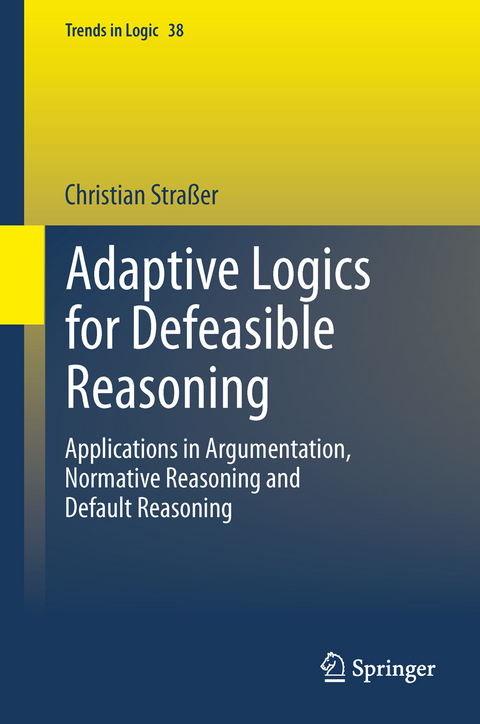
Adaptive Logics for Defeasible Reasoning
Springer International Publishing (Verlag)
978-3-319-00791-5 (ISBN)
This book presents adaptive logics as an intuitive and powerful framework for modeling defeasible reasoning. It examines various contexts in which defeasible reasoning is useful and offers a compact introduction into adaptive logics.
The author first familiarizes readers with defeasible reasoning, the adaptive logics framework, combinations of adaptive logics, and a range of useful meta-theoretic properties. He then offers a systematic study of adaptive logics based on various applications.
The book presents formal models for defeasible reasoning stemming from different contexts, such as default reasoning, argumentation, and normative reasoning. It highlights various meta-theoretic advantages of adaptive logics over other logics or logical frameworks that model defeasible reasoning. In this way the book substantiates the status of adaptive logics as a generic formal framework for defeasible reasoning.
Christian Straßer obtained his PhD at the Centre for Logic and Philosophy of Science at Ghent University. His main research activities concern defeasible and normative reasoning. Having a background in both philosophy and computer science, he is interested in normative accounts of human reasoning as well as artificial intelligence. http://ugent.academia.edu/ChristianStraßer
Chapter 1. Introduction.- Part I. Adaptive Logics as a Framework for Defeasible Logics.- Chapter 2 The Standard Format of Adaptive Logics.- Chapter 3. Sequential Combinations of ALs.- Chapter 4. On the Transparency of Defeasible Logics: Equivalent Premise Sets, Equivalence of Their Extensions, and Maximality of the Lower Limit.- Chapter 5. Generalizing the Standard Format.- Part II. Conditional Logics of Normality.- Chapter 6. Adaptively Applying Modus Ponens in Conditional Logics of Normality.- Chapter 7. An Adaptive Logic for Rational Closure.- Part III. Argumentation Theory.- Chapter 8. Towards the Proof-Theoretic Unification of Dung's Argumentation Framework: An Adaptive Logic Approach.- Chapter 9. Allowing for Joint Attacks.- Part IV. Deontic Logics.- Chapter 10. Avoiding Deontic Explosion by Contextually Restricting Modal Inheritance.- Chapter 11. An Adaptive Logic Framework for Conditional Obligations and Deontic Dilemmas.- Chapter 12. A Deontic Logic Framework Allowing for Factual Detachment.- Appendices.
"This is a book on the application of a class of logics, called adaptive logics, to a particular form of reasoning, in effect, of a defeasible kind. ... this book is clearly aimed at people interested in knowing the reaches of a formal logic formalism, from a philosophical viewpoint, without great concern for complexity and computational issues. And it may also serve a public with such computational concerns looking for an articulated starting point." (Marcelo Finger, Mathematical Reviews, April, 2016)
| Erscheint lt. Verlag | 13.12.2013 |
|---|---|
| Reihe/Serie | Trends in Logic |
| Zusatzinfo | XVIII, 438 p. 34 illus. |
| Verlagsort | Cham |
| Sprache | englisch |
| Maße | 155 x 235 mm |
| Gewicht | 842 g |
| Themenwelt | Geisteswissenschaften ► Philosophie ► Allgemeines / Lexika |
| Geisteswissenschaften ► Philosophie ► Logik | |
| Informatik ► Theorie / Studium ► Künstliche Intelligenz / Robotik | |
| Naturwissenschaften | |
| Schlagworte | abnormality-based reasoning • abstract argumentation • adaptive logic • conditional logics of normality • Default Logic • defeasible modus ponens • Defeasible Reasoning • deontic conflicts • Deontic Logic • deontic paradox • diachronic defeasibility • dynamic proofs • Logik • Nonmonotonic Logic • plausible reasoning • preference semantics • reasoning on the basis of uncertainty • selection semantics • standard format for adaptive logics • synchronic defeasibility |
| ISBN-10 | 3-319-00791-2 / 3319007912 |
| ISBN-13 | 978-3-319-00791-5 / 9783319007915 |
| Zustand | Neuware |
| Haben Sie eine Frage zum Produkt? |
aus dem Bereich



